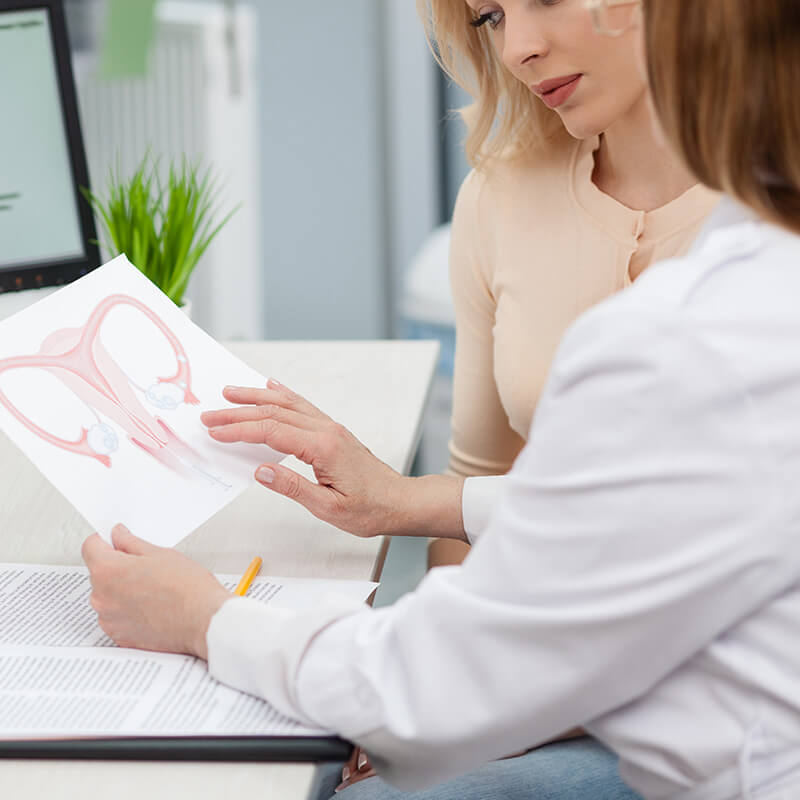
If you and your partner are in your 20’s or early 30’s and experiencing trouble getting pregnant after a year of unprotected intercourse, it is recommended that you consult with a fertility specialist. Women 35 years old and above should be evaluated after 6 months
What is Fertility Treatment Planning?
In order to have the best chance for pregnancy, a thorough fertility evaluation is needed to diagnose and correctly treat you or your partner’s condition. At Inovi, your comprehensive treatment plan will include basic testing to determine if your infertility can be identified. These include:
- Hormone Evaluation
- Hysterosalpingogram
- Transvaginal Ultrasound
- Semen Analysis
- Genetic Testing (Carrier screening)
- Diagnostic Hysteroscopy or Laparoscopy (when indicated)
At times, the source of your infertility is unable to be identified by the tests above. This is called, unexplained infertility but still can have a roadmap for a positive pregnancy outcome with IVF or donor eggs.
LEARN MORE ABOUT EGG DONOR AND THE DONOR EGG PROGRAM.
LEARN MORE
What Are Fertility Treatment Steps?
Clomid ovulation stimulation
Often to help you ovulate or treat irregular ovulation patterns you are prescribed an oral medication such as Clomid or other medications as a first step. Monitoring, blood work and an ultrasound to make sure that the medication is stimulating your ovaries may accompany this process. Data shows that for some women Clomid works well however, after trying with use for 3–4 cycles, your chances for a successful pregnancy are dramatically lowered.
Non-medication cycle with intrauterine induction (IUI)
If you do not need or desire to use ovulating induction medications, your treatment plan may include intrauterine insemination (IUI). In this option, your partner’s sperm is placed inside the uterus at a point closer to the egg. Often this is recommended for mild to moderate male factor infertility.
Ovulation induction (OI) with IUI
Sometimes this may be recommended so that you receive benefits of Clomid to produce ovulation but bypass the side effects of thickened mucus that sometimes may block penetration of the sperm. With IUI, the sperm is placed near the egg with less risk of it encountering the thickened mucus.
Injectable medication cycle with IUI
If you are diagnosed with diminished ovarian reserve, or other hormone problems this treatment could be part of your fertility plan. Since Clomid would be virtually ineffective in these cases, there are other injectable medications such as Letrozole utilizing the right time to place the sperm in IUI.
In Vitro Fertilization
If you have tried IUI for 3 cycles, your chances for success are lowered in subsequent ones. If you are under 35, your doctor may decide another cycle would be warranted under certain conditions. If you are 35 or over, this is the point you may want to consider in vitro fertilization (IVF) treatment. It carries the highest rate of success while using the couple’s own egg and sperm. With IVF, you will have the opportunity of freezing your embryos for future use providing many chances for additional children.
Donor Egg Treatment
Women who have been diagnosed with premature ovarian function, decreased ovarian function or genetic abnormalities may be encouraged to consider a donor egg process. This may be used after other treatment options have proven unsuccessful. Donor eggs actually carry the highest pregnancy success of any fertility treatment since these donors are usually in their early 20s up to 31 and their ovarian supply is the highest at this time.

A thorough fertility evaluation is needed to diagnose and correctly treat you or your partner’s condition
What Are Fertility Treatment Costs?
Fertility treatments can be costly due to the number of cycles, medications, specialized lab techniques and testing. As you consider your next steps, our financial counselors will assist you in understanding your insurance benefits as well as ways to provide the most cost efficient and effective treatment plan. We do offer financing options that can be discussed as well.
If you are over 35 or have been diagnosed with unexplained infertility, studies have shown that ovarian stimulation with Clomid alone may not be the most cost effective treatment plan. Moving on to a more advanced option such as IVF or donor egg treatment may be your best opportunity to become pregnant.
If you are considering fertility treatments, take the next step to learn more. Call or schedule your private consultation with Dr. Krotz and his fertility team at (713) 401-9000.

